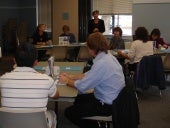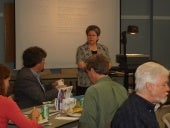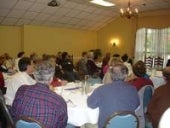 |
A generational “changing of the guard” is underway in the American professoriate (Rice et al. 2000). The magnitude and challenge of this change starts with the significant technological and fiscal/financial differences between life in the academy in the 1970’s and that in the 21st century. The challenge continues on to include large differences in the ways retiring, senior faculty have experienced their careers and the quality-of-life expectations combined with employment conditions of the next generation of new faculty. |
 |
Increasingly, early-career faculty face changing requirements for tenure, a more competitive research climate, increasing teaching and service demands, and overall earlier vulnerability. Recently-hired faculty have different needs and desires than their predecessors regarding work, life, and family balance. As well, the diversification of the professoriate in recent decades has produced a population of underrepresented faculty (faculty of color, First Nations faculty, women, part-timers) for whom these issues manifest differently. The changing face of life on campus also includes a changing student body. |
 |
Research has demonstrated that senior colleagues play a highly important role in creating the kind of academic environment that supports the success of early-career faculty (Rice, et al., 2000; Sorcinelli, 2000).Mentoring is intended to provide intellectual, professional, and social support as new faculty develop their careers and their professional identities. |
This is an archived site.
Why Mentoring?
Copyright © 2024 University of Rhode Island.
 URI Homepage
URI Homepage






